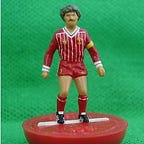September Football Book of the Month: Ring of Fire by Simon Hughes
“There’s an extraordinary desire in football to narrow success down to a binary decision.”
For the majority of Liverpool fans, Rick Parry remains someone who contributed hugely to the club’s demise. He was publicly seen as the man who opposed Rafa Benitez and whose dithering lost the club targets that had been lined up. Even worse, he is the person who engineered Liverpool’s sale to Tom Hicks and George Gillett, the two Americans who eventually drove the club to the brink of bankruptcy.
Unlike former players or managers who often have the opportunity of telling their side of the story in their own biographies, Parry was never going to get that option. So his thoughts were ever going to be captured in a book like this.
Ring of Fire sees Simon Hughes continue where he left off in his previous books (The Red Machine and Men In White Suits) as he analyses another decade — in this case the first ten years of this century — by talking to a whole host of former Liverpool players.
Yet it is that phrase (at the top of this article) by Liverpool’s former CEO that most resonates for it touches on a point that is rarely mentioned within football. Fans see the game as being either black or white. A game was lost because the manager picked player A rather than player B. The outcome of a season is down to which players were or weren’t bought. There are no grey areas.
This book is full of those examples. According to the public reading of the story, Fernando Torres left Liverpool because he was greedy. Here, giving a rare interview, he explains how he was repeatedly lied to and, at the same time, how no one ever really told him that they didn’t want to sell him. It is the same with another little loved former Liverpool striker, Michael Owen, who explains how desperately he wanted to re-join Liverpool.
Not everyone will be willing to accept those players’ versions yet their inclusion here is a powerful addition because deep down there is a common factor uniting these two: both came to regret their decision. Perhaps Torres does not state it as clearly as Owen does but the feeling of regret leaps off the pages.
Which is all to Hughes huge credit as an interviewer and writer. He is not one to go in chasing for answers of controversial questions but still manages to get the players talking about them and this makes the replies all the more sincere. His approach does not always work — I expected more of an explanation by Phil Thompson about why things fell away so desperately in the latter half of Houllier’s reign — but it is a rare miss.
If Hughes’ interviewing skills is one of the strengths of this book, his choice of interviewees to detail this decade is another one. He does not simply go for the big names but also for those who filled the gaps between the stars, players like Neil Mellor and Albert Riera. Their inclusion gives a more rounded feel to the book and although they are not high profile, they are never boring. In fact, it is the opposite.
Ultimately you go away from this book with a feeling of ‘what if?’. Which is pretty fitting because it is that brief question that best captures Liverpool’s decade.
Interested? Buy Ring of Fire.
A review copy was supplied by the book publisher. If you do plan to buy this book, please do so by clicking on the links used here. They will not impact your cost but a (tiny) fraction of the price will make its way to Cultured Football and will thus help in the running of this blog.
